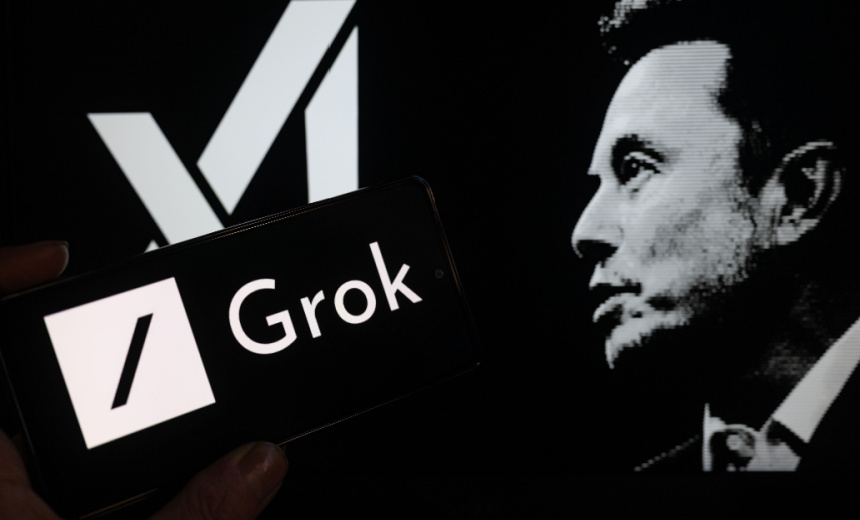Artificial Intelligence & Machine Learning
,
Next-Generation Technologies & Secure Development
Grok 3 Aims to Close Gap With GPT-4o, Gemini, Touting ‘Truth-Seeking’ AI

Elon Musk-owned artificial intelligence company xAI released a new model late Monday night, its answer to OpenAI’s GPT-4o and Google Gemini.
See Also: From Silos to Synergy: Gen AI Aligns IT and Security Teams
The “Grok 3” model can analyze images and respond to questions like its counterparts, and powers features on Musk’s social network X, formerly Twitter.
xAI has been using a data center in Memphis containing around 200,000 GPUs to train Grok 3. Musk in a social media post claimed that Grok 3 was developed with “10x” more computing than its predecessor Grok 2, and with an expanded training data set that ostensibly includes filings from court cases paired with a claim from Musk derided by legal experts that it “will render extremely compelling legal verdicts.”
The latest version is an “order of magnitude more capable than Grok 2,” Musk said during a live-streamed presentation Monday. The model is a “maximally truth-seeking AI, even if that truth is sometimes at odds with what is politically correct,” he said.
xAI co-founders Jimmy Ba and Yuhuai Wu, and lead engineer Igor Babuschkin, joined Musk to detail the model’s advanced reasoning, speed and increased training features.
Grok 3 is technically a family of models.
A smaller version is the Grok 3 mini, which responds to questions more quickly at the cost of some accuracy.
xAI claims that Grok 3 beat GPT-4o on benchmarks such as AIME, which evaluates a model’s performance on a sampling of math questions, and GPQA, which assesses models using PhD-level physics, biology and chemistry problems. An early version of Grok 3 also scored the top spot in Chatbot Arena, a crowdsourced test that pits different AI models against each other and has users vote on their preferred responses.
Two variations of Grok 3 – Reasoning and mini Reasoning – can “think through” problems, similar to “reasoning” models like OpenAI’s o3-mini and Chinese AI company DeepSeek’s R1. Reasoning models are supposed to fact-check themselves before giving out results.
xAI claims that Grok 3 Reasoning surpasses the best version of o3-mini, which is the o3-mini-high, on popular benchmarks, including a newer mathematics benchmark called AIME 2025.
The reasoning models can be accessed via the Grok app. Users can ask Grok 3 to “think,” or for more difficult queries use “big brain” mode for reasoning that employs additional computing. xAI describes the reasoning models as best suited for mathematics, science and programming-related questions.
Musk added that in the Grok app, some of the “thoughts” from the reasoning models are obscured to prevent distillation, a method used by AI model developers to extract knowledge from another model. DeepSeek faces accusations of distilling OpenAI’s models to create its own.
Grok’s reasoning models also feature DeepSearch, similar to OpenAI’s deep research tool. It scans the internet and X to analyze information and deliver an abstract in response to a question.
The Grok app is expected to get a voice mode, which will give Grok models a synthesized voice. Grok 3 models should later arrive in xAI’s enterprise API, along with the DeepSearch capability, Musk said.
xAI plans to open-source Grok 2 in the coming months. “Our general approach is that we will open-source the last version when the next version is fully out,” he said. “When Grok 3 is mature and stable, which is probably within a few months, then we’ll open-source Grok 2.”
When Musk announced Grok about two years ago, he pitched it as edgy, unfiltered and “anti-woke,” willing to answer controversial questions other AI systems won’t. He appears to have delivered on some of that promise. Told to be vulgar, Grok and Grok 2 would oblige, but hedge on political subjects. A study found that Grok leaned to the political left on topics like transgender rights, diversity programs and inequality. Musk blamed the behavior on the training data, which includes public web pages, and promised to “shift Grok closer to politically neutral.” It’s not yet clear whether xAI achieved that goal, and what the consequences might be.
